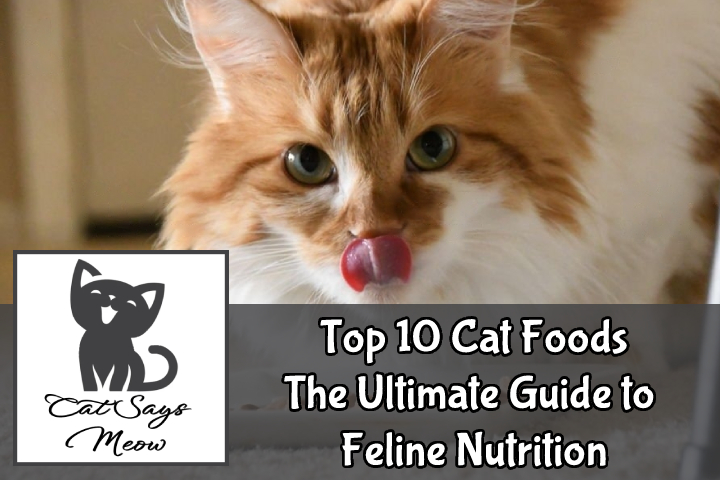When a cat gags at the smell of food, it can be pretty disgusting, but it also tells us a lot. There are various reasons why cats gag when they catch a whiff of food.
If a cat gags when it smells its food, it could be because they find the taste unpleasant. This could also indicate that the cat has medical problems like asthma or allergies. It’s important to take into account various factors to determine if your cat requires veterinary attention or a change in diet.
Cats have a whopping 65 million smell receptors, so it’s likely that the food is making them gag. Let’s explore why your cat’s sense of smell might be telling them to reject their food!
Reasons For Gagging At Food
Cats may gag when they smell food due to various reasons. This can range from not enjoying the scent to having an allergic response to the ingredients. Even the texture of the food, whether it’s too soupy or too hard, can trigger this reaction. It’s quite common for cats to dry heave when they encounter something they don’t like. Cats are sensitive creatures when it comes to their meals.
Here are some common reasons why your cat might be gagging when they smell their food.
Not a fan
One possible reason why your cat may be gagging at their food is that they might not enjoy the smell. Cats have a vomeronasal sac, also called the Jacobson’s organ, which is connected to their sense of smell. This organ is found in the upper part of their mouth. When cats encounter unpleasant smells, they make a grimace and use their tongue to direct the smell towards the back of their throat, resulting in the gagging sound.
When your cat smells a new food that doesn’t appeal to them, they may gag. If you intentionally introduced the new food, it’s easy to choose a different option. Discovering your cat’s preferred foods, especially if you have a new cat, may require some trial and error. Cats are more likely to have a positive reaction to foods that contain natural proteins like tuna, chicken, or turkey.
If your cat doesn’t like the prescribed food, you can try mixing it with something tasty like tuna, testing out different temperatures, or adding flavor enhancers.
It is recommended that cat foods contain a minimum of 25% crude protein, but it is even better if they have 30 or 35%. It’s best to avoid ingredients such as cornmeal, gluten, and byproducts as they are not good for your cat and may not be liked.
Texture
Even if your cat food has the correct ingredients and smells good, the texture is also important. There are different textures of cat food, such as pâté, sliced, grilled, minced, and more. Cats have their own preferences when it comes to how their food is served because it affects how it feels in their mouth and how easily they can swallow it.
Your cat may enjoy different flavors or prefer a specific flavor prepared in a particular way, especially if they are older or have dental problems. Gagging is an indication that they are not fond of the taste or the consistency of the food.
More Complex Reasons For Gagging
Imagine this: your cat is happily eating their food, and all of a sudden, they start gagging. It might mean that they’ve suddenly become picky eaters, but it could also be a sign of something more serious.
Hairballs
Every cat experiences hairballs because they groom themselves excessively. Hairballs are more prevalent in certain cats compared to others. When cats detect the scent of their food, especially if it has a new smell, it triggers a reflex in their throat, leading them to cough up the fur they have accumulated. While hairballs are normal to some extent, it is not ideal for cats to cough them up every time they smell their food. It might be time to consider changing their diet!
Stomach troubles
While not always indicating stomach problems, cats may gag when they encounter strong smells due to indigestion or acid reflux. It is crucial to promptly bring your cat to the veterinarian. Keep in mind that what works for one cat’s diet may not work for another. Each cat is unique, and there may be underlying digestive issues that make certain foods unsuitable for them.
Bacterial infections
It’s a big worry that cats can catch bacterial infections, especially from food that hasn’t been prepared correctly.
Clostridium perfringens is a bacteria that is often found in raw or undercooked meat and poultry. It thrives in low-oxygen environments. If a can of cat food is not processed correctly, it can become an ideal place for the bacteria to grow, leading to symptoms such as gagging, loss of appetite, feeling sick, and throwing up.
This occurs less frequently when using processed foods, but is more common when using homemade foods. Although it is beneficial to prepare your own cat food, it is important to have knowledge and take proper care of the ingredients. Factors such as the serving temperature, proper preservation of ingredients, and the protein levels and consistency of the food all play a role.
Other Gagging Causes
Occasionally, a cat may experience a gag reflex when they catch a whiff of food due to a combination of flavors in their surroundings. It is crucial to ensure that your cat has a clean eating area. It is strongly advised to place their feeding spot away from the litter box and in a location where they won’t be exposed to potential sources of illness.
Bad smells in the house
Cats have sensitive noses that can be bothered by various smells, including citrus, certain flowers, spices, and houseplants. These scents can be unpleasant for cats and may even make them gag. Some of these smells are used to discourage cats from spraying or scratching furniture. If you have recently used a spray or scent like this to modify your cat’s behavior and it is causing gagging, it might be working too effectively!
Blockages in the throat
If your cat starts to gag out of nowhere and is also scratching their mouth, drooling, or having difficulty breathing, check if there’s any food or object stuck in their throat. Cats that play with toys near their food or accidentally eat bits of cardboard from their scratching post are especially at risk.
If your cat is having trouble breathing, check out these tips to help you out.
A gag-free environment
It’s likely that your cat’s gagging when smelling their food is because they don’t want to eat it. However, there could be other reasons for this behavior, and gagging is a clear indication that something is amiss. Start by examining their eating habits before considering other potential causes. If you’re unable to identify the problem and the gagging continues, it’s best to take your cat to the veterinarian for further evaluation.
When To Take Your Cat To The Vet For Gagging
If you notice your cat gagging in an unusual or repetitive way, it might be a good idea to bring them to the vet. The vet can examine your pet and provide solutions to address the issue. Before making a trip to the vet, keep the following points in mind:
- The cat makes loud meowing sounds while gagging and continues to do so afterwards.
- Cats regurgitating their entire meal
- Unusual coloration of cat waste
- Going back and forth to the water bowl over and over again
- Stuff in the nose
- A dry cough (which could be cat asthma)
- Your cat may have eaten visible objects that were blocking the food bowl.
The most worrying signs mentioned earlier include unusual changes in waste color, a dry cough, or finding items in your cat’s food bowl that they shouldn’t have eaten. Identifying a dry cough can be challenging as it may indicate something more than just a hairball. Cats that cough after drinking water or eating may be experiencing some type of asthma.
Conclusion
You can also check this YouTube video about this topic:
Related posts
Can Cats Eat Sausage
Do Cats Understand Words
Orange Cat Breeds
Can You Get Cats On Craigslist
Why Do Cats Bite Each Others Necks
Check out our top 10 reviews!
[Wikipedia] [Encyclopedia Britannica] [National Geographic] [cdc.gov] [Purina]



